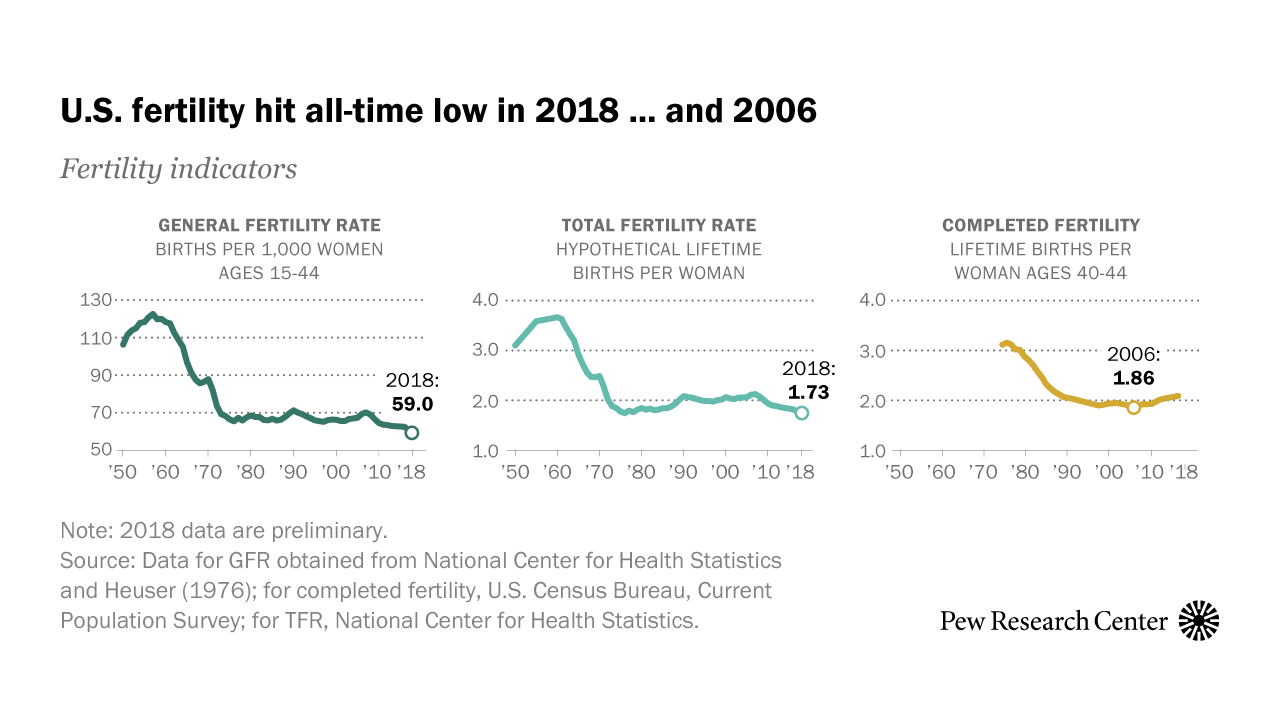
Yesterday, I saw a lot to remind me of U.S. birth and fertility rates continue falling and setting record lows for Father's Day. First, I gave it and the rest of the top posts from June 2019 social media boosts for #FlashbackFriday. It was the entry that appeared in the most categories for the month. The entry was the 7th most read entry posted during June 2019 and 9th overall with 288 default and 332 raw page views. It also tied for second most commented on entry during the month with four, and tied for most replies to a single tweet during June 2019 with 3 replies in 1 thread. Impressive. Second, Wochit News posted an update on U.S. birth rates with Birth Rates At An All Time Low.
New data from the National Vital Statistics System shows birth rates are at an all-time low in the United States.On the one hand, the U.S. is doing its part to slow down population growth. On the other hand, a possible shrinking economy in the future, which is bad for business as usual. It's time to be a good environmentalist and recycle what I wrote last year.
There were just 59.1 births for every 1,000 women between the ages of 15 and 44 in 2018.
Experts worry this could eventually result in a "demographic time bomb," says Business Insider.
Such a time bomb would mean fertility rates decrease at the same time longevity increases.
This decreases the workforce as well as the number of people able to stimulate the economy.
The trend represents some societal shifts, like a decrease in teenage pregnancies and unlivable wages.
I have been in favor of zero population growth for as long as I can remember. However, I'm not sure the U.S. economy is set up for a stable or slowly declining population, a point I made in the Hipcrime Vocab: Why Slowing Population Growth is a Problem. We are going to have to figure how to do so. Otherwise, I might live long enough to experience the wisdom of the saying "Be careful what you wish for; you might get it."Here's to hoping the U.S. learns how to thread that needle.
Birth rates have been dropping almost everywhere in the world, so it's not a uniquely US problem. But I'm sure wage stagnation and a dysfunctional health-coverage system don't help.
ReplyDeleteFrance and Scandinavia have had some success at increasing the birth rate by greatly increasing social support for parents, or so I've heard. But Republicans would never do that here. They'd probably use this as another argument for banning abortion.
I suspect that deep down the number of children people want to have is just simply lower than two per couple on average. Nowadays they have the means to implement what they want. Increasing longevity, or rather increasing the healthy lifespan (of which longer overall longevity is a side effect) is probably the only solution -- the longer active/productive lifespan will offset the lower birth rate by shoring up economic productivity and lowering the death rate.
They have been dropping everywhere, which is good news from a sustainability perspective, even if it can go too far as far as business as usual is concerned. As for wage stagnation and a dysfunctional health system, those are likely making things worse in the U.S., along with student debt.
DeleteFrance in particular has been successful, as it's the only European country with a fertility rate above 2. In a couple of decades, it will be the most populous nation in Europe, not Germany, and will overtake the latter in GDP, another business as usual measure.
As for the Republicans making this another argument in favor of banning abortion, of course they would.
I think you're right about a longer productive lifespan being the solution to offset fewer children. I just hope we get it.